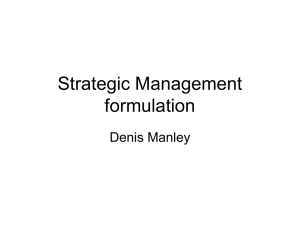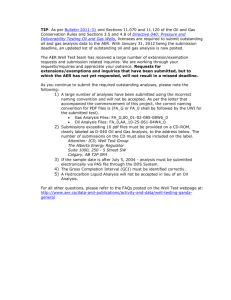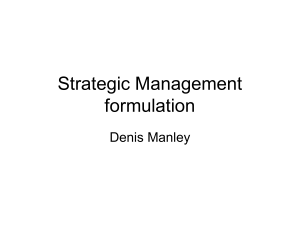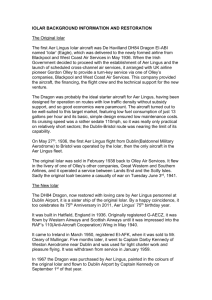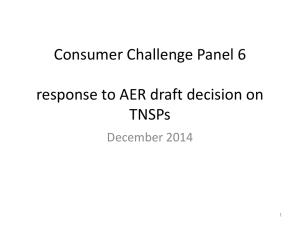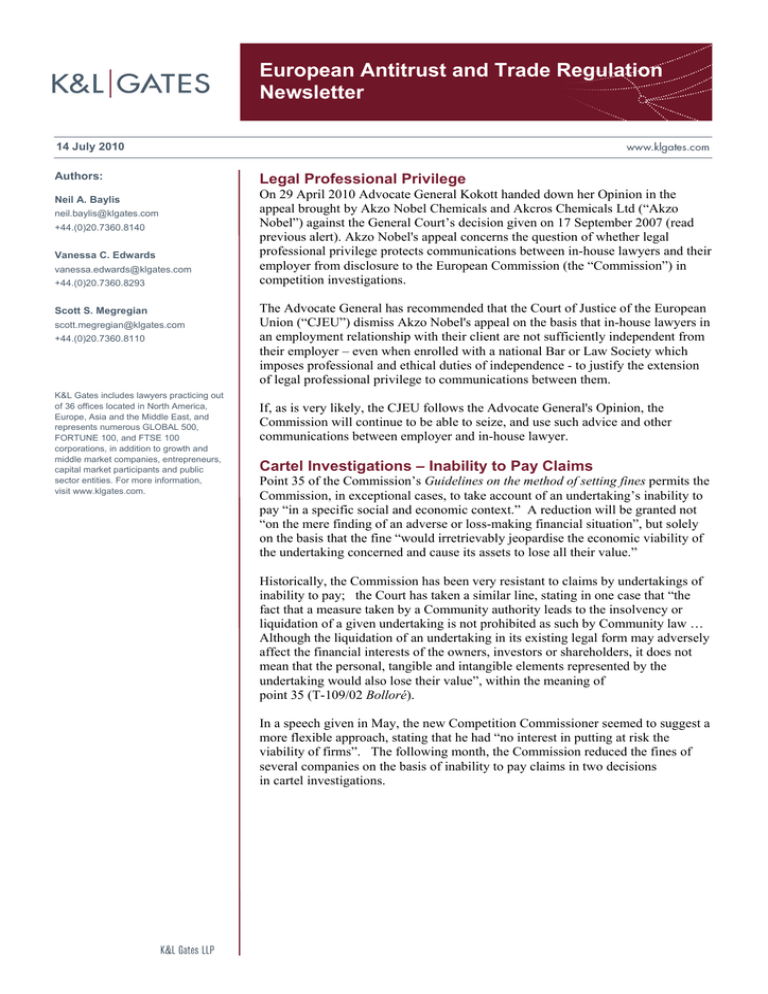
European Antitrust and Trade Regulation
Newsletter
14 July 2010
Authors:
Neil A. Baylis
neil.baylis@klgates.com
+44.(0)20.7360.8140
Vanessa C. Edwards
vanessa.edwards@klgates.com
+44.(0)20.7360.8293
Scott S. Megregian
scott.megregian@klgates.com
+44.(0)20.7360.8110
K&L Gates includes lawyers practicing out
of 36 offices located in North America,
Europe, Asia and the Middle East, and
represents numerous GLOBAL 500,
FORTUNE 100, and FTSE 100
corporations, in addition to growth and
middle market companies, entrepreneurs,
capital market participants and public
sector entities. For more information,
visit www.klgates.com.
Legal Professional Privilege
On 29 April 2010 Advocate General Kokott handed down her Opinion in the
appeal brought by Akzo Nobel Chemicals and Akcros Chemicals Ltd (“Akzo
Nobel”) against the General Court’s decision given on 17 September 2007 (read
previous alert). Akzo Nobel's appeal concerns the question of whether legal
professional privilege protects communications between in-house lawyers and their
employer from disclosure to the European Commission (the “Commission”) in
competition investigations.
The Advocate General has recommended that the Court of Justice of the European
Union (“CJEU”) dismiss Akzo Nobel's appeal on the basis that in-house lawyers in
an employment relationship with their client are not sufficiently independent from
their employer – even when enrolled with a national Bar or Law Society which
imposes professional and ethical duties of independence - to justify the extension
of legal professional privilege to communications between them.
If, as is very likely, the CJEU follows the Advocate General's Opinion, the
Commission will continue to be able to seize, and use such advice and other
communications between employer and in-house lawyer.
Cartel Investigations – Inability to Pay Claims
Point 35 of the Commission’s Guidelines on the method of setting fines permits the
Commission, in exceptional cases, to take account of an undertaking’s inability to
pay “in a specific social and economic context.” A reduction will be granted not
“on the mere finding of an adverse or loss-making financial situation”, but solely
on the basis that the fine “would irretrievably jeopardise the economic viability of
the undertaking concerned and cause its assets to lose all their value.”
Historically, the Commission has been very resistant to claims by undertakings of
inability to pay; the Court has taken a similar line, stating in one case that “the
fact that a measure taken by a Community authority leads to the insolvency or
liquidation of a given undertaking is not prohibited as such by Community law …
Although the liquidation of an undertaking in its existing legal form may adversely
affect the financial interests of the owners, investors or shareholders, it does not
mean that the personal, tangible and intangible elements represented by the
undertaking would also lose their value”, within the meaning of
point 35 (T-109/02 Bolloré).
In a speech given in May, the new Competition Commissioner seemed to suggest a
more flexible approach, stating that he had “no interest in putting at risk the
viability of firms”. The following month, the Commission reduced the fines of
several companies on the basis of inability to pay claims in two decisions
in cartel investigations.
European Antitrust and Trade Regulation Newsletter
In Bathroom fittings (Case 39092, Decision of 23
June 2010), ten companies made inability to pay
applications; the fines of three companies were
reduced by 50% and those of another two by 25%
given their difficult financial situation. The
Commission looked at recent financial
statements, provisional current year statements
and future projections, several financial ratios
that measure a company’s solidity, profitability,
solvency and liquidity, and relations with banks
and shareholders. The Commission also looked at
the social and economic context of each
company. Finally, the Commission assessed
whether the companies' assets would be likely to
lose significant value if the companies were to be
forced into liquidation as a result of the fine. The
analysis is company-specific and aims to be as
objective and quantifiable as possible to ensure
equal treatment and preserve the deterrence
aspect of EU competition rules.
At a press conference on the day of the decision,
Commissioner Almunia said that the Commission
was aware that some companies, particularly in
today’s economic climate, may be in financial
difficulties: “Those companies should not be
made bankrupt because of the Commission’s
fine. Where their financial difficulties are real,
the Commission will take that into account and
lower the fine. … What we assess is whether the
fine we are planning to impose would cause …
the bankruptcy of the company.”
In Prestressing steel producers (Case 38344,
Decision of 30 June 2010), the Commission
accepted three of the thirteen inability-to-pay
applications received and granted reductions of
respectively 25%, 50% and 75% of the fines that
would otherwise have been imposed. The press
release states “When assessing a company's claim
that it is unable to pay, the Commission looks at
the financial statements for recent years and
projections for the current and coming years; at
ratios measuring the financial strength,
profitability, solvency and liquidity and their
relations with outside financial partners and with
shareholders. The Commission also examines the
social and economic context of each company
and assesses whether a company's assets would
be likely to lose significant value if it were to be
liquidated as a result of the fine.”
Cartel Settlement
In May, the Commission reached its first cartel
settlement in the DRAM investigation. The
settlement procedure, introduced in 2008, allows
the Commission to settle cases through a
simplified procedure. Under this procedure,
parties, having seen the evidence in the
Commission file, choose to acknowledge their
involvement in the cartel and their liability for it.
In return for this acknowledgement, the
Commission can reduce the fine imposed on the
parties by 10%. In the DRAM case, the
Commission imposed fines totalling €331
million on ten producers of DRAM memory
chips. All companies benefited from a reduction
of 10% under the settlement procedure; in
addition, some fines were reduced to take
account of the companies’ cooperation in the
investigation and other mitigating
circumstances. An additional company received
full immunity under the Commission’s Leniency
Notice from the fine which would have been
imposed on it, having been the first to inform the
Commission of the cartel.
Access to Documents
A number of recent decisions by the CJEU and
the General Court have considered the extent of
the right of access to documents held by the
Competition Directorate-General of the
European Commission in the context of
antitrust procedures.
Case C-139/07 P Commission v Technische
Glaswerke Ilmenau arose out of an application
by Technische Glaswerke Ilmenau (“TGI”) for
access to all the documents in the Commission’s
files regarding a decision that a payment waiver
in favour of TGI was State aid and a separate
investigation into alleged State aid to TGI. The
Commission rejected the application on the
ground that disclosure would be likely to
undermine the protection of the purposes of
inspections and investigations. The Court of
First Instance (“CFI”) annulled the
Commission’s decision on the basis that the
Commission had not examined the documents
requested in a concrete, individual manner. On
29 June the CJEU set aside that judgment on the
ground that the CFI had not explained how
access to the documents could specifically and
effectively undermine inspections and
investigations. The CJEU noted that the
procedure for reviewing State aid is initiated in
respect of the Member State responsible for
granting the aid and does not confer a right on
other interested parties to consult the documents
on the Commission’s file; if those interested
parties were able to obtain access to the
Commission’s file, the system for the review of
State aid would be called into question. The
CJEU then upheld the Commission’s decision on
the basis that there existed a general presumption
that disclosure of the documents on the
14 July 2010
2
European Antitrust and Trade Regulation Newsletter
Commission’s administrative file in a State aid
investigation would, in principle, undermine the
protection of the purposes of inspections
and investigations.
In the following two judgments, the General
Court annulled the Commission’s refusal to
disclose certain documents concerning a merger
investigation after the merger had been
approved. The following summaries note points
of particular interest made by the Court.
In Case T-111/07 Agrofert Holdings v
Commission (7 July 2010), the General Court
ruled that documents exchanged between the
Commission and the notifying parties and
between the Commission and third parties were
likely to contain commercially sensitive
information and so would be covered by an
exception to the obligation to disclose, but that
the Commission had not made the requisite
specific examination of each document. Internal
communications with the Commission’s Legal
Service would be exempt from disclosure that
was liable to undermine the protection of legal
advice, but when refusing access to documents on
the basis of that exception, the Commission must
explain how access to the document could
specifically and effectively undermine its interest
in seeking and receiving frank, objective and
comprehensive legal advice; although it may rely
on presumptions that apply to certain categories
of documents, it must explain how the
presumption is in fact applicable to a specific
requested document. Finally, other internal
correspondence relating to the draft decision
could (even after the decision had been taken) be
exempt on the ground that disclosure would
undermine the Commission’s decision-making
process, but the Commission must demonstrate
that access to each document was likely
specifically and actually to undermine protection
of that process on the basis of the information
actually contained in that document.
In Case T-237/05 Éditions Jacob v
Commission (9 June 2010), the General Court
stressed that the Commission must specifically
and individually examine each requested
document rather than apply general categories to
the requested documents. Documents that
formed part of the informal pre-notification
procedure may be exempt from disclosure that
could endanger the completion of inspections and
investigations for so long as the investigations or
inspections continued. The Commission had
argued that, since an appeal had been lodged
against the merger decision, that exemption still
applied. The General Court stated that that
interpretation would make access to documents
dependent on an unpredictable and possibly
distant future event which would be contrary to
the objective of guaranteeing public access to
documents. With regard to third party
documents, the Commission must consult
relevant third parties with a view to assessing
whether an exception is applicable, unless it is
clear that the document should or should
not be disclosed.
Ryanair / Aer Lingus
On 6 July 2010 the General Court dismissed in
its entirety an appeal by Ryanair against the
European Commission’s decision to prohibit
Ryanair’s proposed acquisition of Aer Lingus.
The Court also dismissed an appeal by Aer
Lingus against the Commission’s refusal to order
Ryanair to divest its minority shareholding
in Aer Lingus.
In October 2006, Ryanair, which held a 19.6%
shareholding in Aer Lingus, launched a hostile
bid for the entire share capital of Aer Lingus.
Following an in-depth Phase II investigation of
the proposed acquisition the Commission issued
a prohibition decision, concluding that Ryanair
and Aer Lingus were each others’ closest
competitor in relation to short-haul flights to and
from Ireland, and that the merger would result in
the parties gaining a monopoly or very strong
market position in the provision of flights on
certain routes. Commitments offered by
Ryanair were deemed insufficient to remedy the
competition concerns that would result
from the transaction.
During the Commission investigation and
subsequent to the Commission’s prohibition
decision, Ryanair acquired further Aer Lingus
shares and increased its stake in the company to
29.3%. Aer Lingus requested that the
Commission initiate proceedings and order
divestment of Ryanair’s shareholding on the
basis that Ryanair had implemented a prohibited
merger by acquiring Aer Lingus shares. In a
second decision, the Commission refused
Ryanair’s request, as it considered that Ryanair’s
minority shareholding did not grant it control
over Aer Lingus and therefore that the proposed
takeover had not been implemented.
Ryanair and Aer Lingus both brought appeals
against the Commission decisions before the
General Court: Ryanair sought annulment of the
Commission’s prohibition decision, and Aer
Lingus sought annulment of the Commission’s
14 July 2010
3
European Antitrust and Trade Regulation Newsletter
refusal to order divestment of Ryanair’s
shareholding in Aer Lingus.
specialisation block exemption, also previously
adopted by the Commission in 2000.
The General Court handed down separate
judgments on each of these appeals, dismissing
them in each case. As regards the prohibition
decision, the General Court confirmed the
Commission’s finding that a dominant position
would be created on a number of routes to and
from Ireland. These dominant positions were
sufficient in themselves to validate the
Commission’s conclusion that the merger would
be incompatible with the common market. As
regards the decision refusing to order Ryanair to
divest its shareholding, the General Court noted
that under the EU Merger Regulation, the
acquisition of a shareholding which does not
confer control of a company does not constitute a
merger. In the absence of effective control by
Ryanair over Aer Lingus, Ryanair’s shareholding
cannot be likened to a merger which has already
arisen and which would give the Commission the
right to act.
The focus in the Draft Guidelines is on R&D,
joint production, joint purchasing, joint
commercialisation, standardisation and
specialisation co-operation between competitors.
This reflects the Commission’s commitment to
encouraging such types of co-operation with a
view to generating efficiency gains and
increasing competition.
Proposed Changes to Rules
Applicable to Horizontal
Cooperation Agreements
On 4 May 2010, the Commission published a
draft version of revised Guidelines applicable to
Horizontal Agreements (the ‘Draft Guidelines’).
Once finalised, the Draft Guidelines will amend
the Commission’s original Guidelines in relation
to Article 101 of the Treaty on the Functioning of
the European Union, ‘TFEU’ (the old Article 81
of the EC Treaty), which clarify the scope of the
exemptions by outlining the specific conditions in
which the above types of agreements will not be
caught by Article 101(1). Article 101(1)
expressly prohibits anti-competitive agreements
between competitors operating on a market.
The Horizontal Guidelines were initially adopted
by the Commission in 2000 and provide an
analytical framework in which to assess
horizontal agreements between market
participants operating at the same level of
production or distribution.
The Commission has, in conjunction with the
Draft Guidelines, also published for consultation
a revised draft Research and Development
(‘R&D’) block exemption and a revised draft
The changes to the revised drafts on the block
exemptions mark a readjustment of the
Commission’s approach instead of a paradigm
shift. Changes brought about by the new draft
block exemption Regulations include the
requirement, under the revised draft R&D block
exemption regulation, to disclose relevant
intellectual property rights and readjustment of
the ‘hardcore’ restrictions. The revised draft
specialisation block exemption Regulation also
introduces a second market threshold for
specialisation and joint production agreements
for products used for internal consumption.
Helpfully, clarification is also provided on the
meaning of ‘potential competitor’, with the
introduction of a three-year timeframe for future
market entry.
Key new changes introduced by the Draft
Guidelines include the introduction of a detailed
section on information exchange between
competitors. With respect to these, the
Commission in the Draft Guidelines recognises
the pro-competitive nature of information
exchange between horizontal competitors and
provides a detailed overview of the type of
information that can be exchanged between
competitors and the manner and circumstances in
which this is allowed.
The new Draft Guidelines also introduce key
changes to standard-setting processes in the
European Union, largely in order to address a
lack of transparency previously prevailing in the
area. For more information on provisions relating
to the revised standard-setting process see
previous alert.
14 July 2010
4
European Antitrust and Trade Regulation Newsletter
Anchorage Austin Beijing Berlin Boston Charlotte Chicago Dallas Dubai Fort Worth Frankfurt Harrisburg Hong Kong London
Los Angeles Miami Moscow Newark New York Orange County Palo Alto Paris Pittsburgh Portland Raleigh Research Triangle Park
San Diego San Francisco Seattle Shanghai Singapore Spokane/Coeur d’Alene Taipei Tokyo Warsaw Washington, D.C.
K&L Gates includes lawyers practicing out of 36 offices located in North America, Europe, Asia and the Middle East, and represents numerous
GLOBAL 500, FORTUNE 100, and FTSE 100 corporations, in addition to growth and middle market companies, entrepreneurs, capital market
participants and public sector entities. For more information, visit www.klgates.com.
K&L Gates is comprised of multiple affiliated entities: a limited liability partnership with the full name K&L Gates LLP qualified in Delaware and
maintaining offices throughout the United States, in Berlin and Frankfurt, Germany, in Beijing (K&L Gates LLP Beijing Representative Office),
in Dubai, U.A.E., in Shanghai (K&L Gates LLP Shanghai Representative Office), in Tokyo, and in Singapore; a limited liability partnership (also
named K&L Gates LLP) incorporated in England and maintaining offices in London and Paris; a Taiwan general partnership (K&L Gates)
maintaining an office in Taipei; a Hong Kong general partnership (K&L Gates, Solicitors) maintaining an office in Hong Kong; a Polish limited
partnership (K&L Gates Jamka sp. k.) maintaining an office in Warsaw; and a Delaware limited liability company (K&L Gates Holdings, LLC)
maintaining an office in Moscow. K&L Gates maintains appropriate registrations in the jurisdictions in which its offices are located. A list of the
partners or members in each entity is available for inspection at any K&L Gates office.
This publication is for informational purposes and does not contain or convey legal advice. The information herein should not be used or relied
upon in regard to any particular facts or circumstances without first consulting a lawyer.
©2010 K&L Gates LLP. All Rights Reserved.
14 July 2010
5


